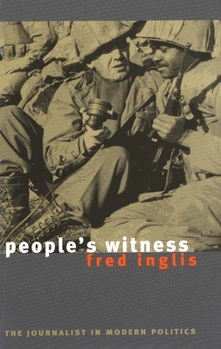People's Witness: The Journalist in Modern Politics
Now, more than ever, political journalists are central figures in the titanic struggles of modern history, not only telling us about events but also interpreting them and shaping our views. This engrossing book explores the relationship between journalism and politics in the twentieth century and tells the stories of the journalists--both good and bad--who have played major roles. Fred Inglis tracks the flamboyant biographies of giants of the...
Format:Hardcover
Language:English
ISBN:0300093276
ISBN13:9780300093278
Release Date:April 2002
Publisher:Yale University Press
Length:432 Pages
Weight:1.78 lbs.
Dimensions:1.5" x 6.2" x 9.5"
Customer Reviews
1 rating
Reporting politics in the Twentieth Century
Published by Thriftbooks.com User , 22 years ago
This book examines the role of journalism in shaping our picture of life in the twentieth century, particularly in terms of political events, and by extension, armed conflicts. Inglis chooses a number of exemplary life-stories, sketching them with his customary flair and economy, before using them to highlight the values that each biography teaches us. The journalists are (for the most part) the heroes and heroines, whilst the newspaper and media owners are a more ambiguous lot, and this depiction is surely as it should be. Journalists like Bill Shirer told the truth of what they saw often despite, rather than thanks to, their employers. A few minor grumbles : Izzy Stone's account of the Wake Island meeting between MacArthur and Truman (15th October 1950) is, as Inglis rightly points out, inferential, but he still repeats it verbatim. The significance of the timing (3 weeks before the mid-term Congressionals) is ignored : part of Truman's reason for making the journey to Wake Island would surely have been to associate himself publicly with his leading field commander at a time when the Korea conflict was going very well for the United Nations forces. MacArthur was a complex character, arrogant, yes, but as America's greatest 20th century general, not without some justification, but certainly not the madman described here. I'm not sure that Ceausecu's execution necessarily fitted his crimes : if we executed every politician who allowed himself to be overthrown, the list of candidates would be a long one. Lastly, I'm not sure why the wartime BBC newsreader Bruce Belfrage (pages 171 & 174) is referred to as Cedric : he always gave his name on radio as Bruce.However, these are minor quibbles. This book is a splendid portrayal of a world in which the written and spoken word have been replaced gradually by TV and the immediacy of live coverage. However, that gain has been at the expense of the descriptive power of language itself.





